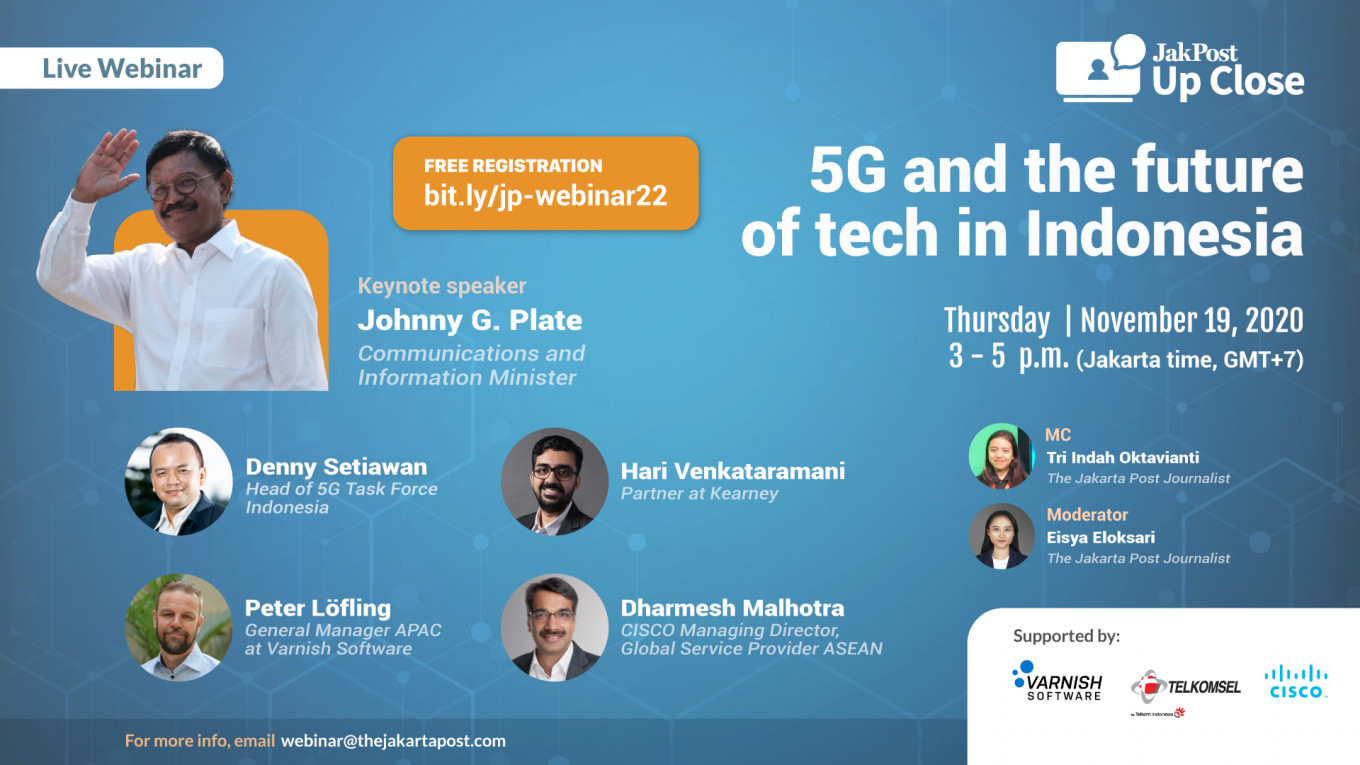Popular Reads
Top Results
Can't find what you're looking for?
View all search resultsPopular Reads
Top Results
Can't find what you're looking for?
View all search results5G and the future of tech in Indonesia
Fifth-generation (5G) cellular network technology is not only slated to provide speedier content downloads.
Change text size
Gift Premium Articles
to Anyone
F
ifth-generation (5G) cellular network technology is not only slated to provide speedier content downloads, but there are also a host of other applications that 5G is capable of, which can transform the way people conduct their day-to-day activities and business, from the internet of things (IoT) to artificial intelligence (AI).
With Indonesia set to become one of the world’s digital economic powerhouses, 5G will play an instrumental role in the economy going forward. With the goal of being among the world’s top five-largest economies by 2045, the digital transformation is a crucial element for enterprises in speeding up growth to move away from a resources-driven economy to a knowledge- and digital-based economy. From smart factories to an AI-based new capital city in Kalimantan and digital-based agricultural businesses, to industrial IoT, Indonesia has the potential to become Southeast Asia’s largest 5G market.
However, Indonesia is still facing challenges in implementing 5G technology, especially in the slow availability of the spectrum, the incompatibility of existing smartphones and a possible price war between telecommunications operators. Other countries in the Asia-Pacific have already started to free up mid-band spectrum and are on their way to implementing a commercial use of 5G.
For Indonesia, 5G is projected to make up 5 percent of total internet connection by 2025, the lowest among Asia-Pacific countries with India predicted at 7 percent, Singapore 34 percent and South Korea leading the region at 67 percent, according to the 2020 GSMA Mobile Economy Asia Pacific report.
Indonesia has formed a 5G task force to speed up adoption of 5G in the country, having tried out 5G in the 2019 Asian Games and many other occasions led by local telecommunication firms.
The Communications and Information Ministry plans to free up 1,880 megahertz (MHz) of spectrum to enable 5G, which is covered in Indonesia’s 2020-2024 National Medium Term Development Plan (RPJMN). If the 5G spectrum is released between 2021 and 2023, the technology can add Rp 2.8 quadrillion (US$197.96 billion) to Indonesia’s economy by 2030, making up 9.3 percent of gross domestic product (GDP), according to a study by the Bandung Institute of Technology’s Industrial and Research Affiliation Institution (LAPI-ITB). The technology can create 4.4 million jobs and increase productivity to Rp 9.4 million GDP per capita in the next decade as well.
Enterprises can contribute 18 to 22 percent to incremental revenue growth while individual consumers can contribute 6 to 9 percent, according to a study by A.T. Kearney. Between $4 billion and $6 billion in investments need to be made annually from 2020 to 2025 to unlock these potentials.
JakPost webinar on 5G and the future of tech in Indonesia
The Jakarta Post webinar series will discuss ways 5G can contribute to technological development in Indonesia and ease consumers’ and businesses experience so as to contribute more to the future of the country’s economy.
The virtual discussion will feature authoritative speakers from relevant stakeholders in the ICT sector to bring about diverse points of view regarding the matter in order to have a constructive public discourse.
The series will highlight issues such as:
- How 5G can transform Indonesia’s economy and make way for a digital transformation among enterprises and consumers.
- From AI-based cities to smart factories and augmented reality to internet of things, what are the applications of 5G in everyday lives and businesses?
- Regulatory framework and government support: challenges in freeing up spectrum and the 5G roadmap in Indonesia.
- How Indonesia fares relative to neighboring countries in the adoption of 5G and lessons learned from the worldwide 5G move.
- Private sector efforts in building supporting infrastructure for 5G in Indonesia.
The Zoom webinar will be held in English from 3 p.m. to 5 p.m. (Jakarta time), on Thursday, Nov. 19 and feature:
- Communications and Information Minister Johnny G. Plate (keynote speech)
- Denny Setiawan, head of Indonesia’s 5G task force
- Hari Venkataramani, partner at Kearney
- Peter Löfling, regional general manager for APAC at Varnish Software
- Dharmesh Malhotra, managing director of global service providers for ASEAN at CISCO
Johnny will share the government’s views on several issues, including the need to improve Indonesia’s internet infrastructure, particularly after the COVID-19 pandemic, as well as government efforts in improving internet access for all on 3G and 4G networks and the government’s plan to speed up the implementation of 5G.
Denny will discuss several topics, including challenges in freeing up spectrum and the 5G roadmap in Indonesia, how prepared re Indonesia’s human resources are to be involved in and to get benefit from the implementation of 5G, how 5G can benefit Indonesia’s economy and the short, mid- and long-term plans of the 5G roadmap.
Hari will speak on the best practices of 5G implementation in the Southeast Asia region, how 5G can boost the countries’ economy and what Indonesia needs to prepare to support 5G.
Löfling will share his views on 5G’s future use and impacts on Indonesia’s economy and society, as well as what it takes to build a 5G network from a technical perspective.
Malhotra will share his insights into new services enabled by 5G and their impacts on the economy and society, and what it takes for Indonesia to build a 5G network compared to other countries in the region.
The JakPost webinar will be useful for the general public, university students, public and private sector leaders and staff members, start-up companies, technology companies, researchers and the international community.










